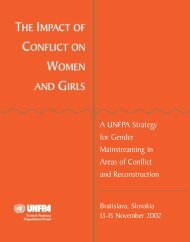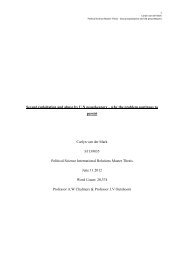Stop Sudah English-revised-March2012 - International Center for ...
Stop Sudah English-revised-March2012 - International Center for ...
Stop Sudah English-revised-March2012 - International Center for ...
You also want an ePaper? Increase the reach of your titles
YUMPU automatically turns print PDFs into web optimized ePapers that Google loves.
2. Sprouts of the Papuan Women’s Movement in Conflict Situations<br />
The ebb and flow of conflict in the Land of Papua has a direct impact on all members of Papuan society,<br />
and women are no exception. The experience of violence that has caused such pain to women has helped<br />
them to <strong>for</strong>ge a clearer understanding of the issues they have experienced, and made them stronger to<br />
survive in uncertain conditions.<br />
At the beginning of the 20 th century, Dutch missionary institutions (UZV and ZNHK) promoted education<br />
that was led by the wives of teachers in an ef<strong>for</strong>t to change the culture of Papuan children. In addition to<br />
the school <strong>for</strong> young boys, Jongens Vervolg School/JVVS, and various vocational schools such as Opleiding<br />
Doorps School Onderwijzers/Odo (Elementary School Teacher Education), in 1949 a <strong>for</strong>mal school was<br />
opened <strong>for</strong> girls, Meisjes Vervolg School/MVVS (Girls’ Middle School). The purpose of establishing schools<br />
was to break the shackles of tradition and culture that impede progress, including that of Papuan girls. A<br />
foundation named Zending Schoollen (Missionary Schools) was established in 1952 <strong>for</strong> the education of village<br />
children, while in the capital city the government established the LSB School (Lagere School B) <strong>for</strong> the<br />
children of civil servants and the public. Then in 1962, the Christian Education Foundation was established<br />
to replace Zending Schollen and it continues to this date. However, entering the period of transition from<br />
Dutch governance to UNTEA in 1962, state vocational schools <strong>for</strong> women were closed. Then Catholic and<br />
Protestant churches established centers of non-<strong>for</strong>mal education <strong>for</strong> Papuan women. On April 2, 1962, the<br />
Evangelical Christian Church (GKI) in West Irian (now GKI in the Land of Papua) founded the <strong>Center</strong> <strong>for</strong><br />
Social Education (PPS), which later became the <strong>Center</strong> <strong>for</strong> Women's Education, Training, and<br />
Development (P3W) in Abepura, Jayapura City of Papua Province. 9 This training center aims to improve<br />
life skills and give women the ability to train other village women. At the opening of the PPS, the first<br />
indigenous moderator of the GKI Synod, the Reverend F. J. S. Rumainum, said, “Woe to a nation if the<br />
men advance, but the women do not participate in the changing times.”<br />
In the early 1970s at Enarotali, Delegatus or the Social Unit (Delsos) of the Catholic Church in Jayapura<br />
founded the Learning Activities Studio (SKB), an educational center <strong>for</strong> women who were candidates to<br />
become community educators. SKB pupils were girls from the Catholic Church and the Kingmi Church<br />
(Evangelical Gospel Tent Church of Indonesia) in a number of villages in various regions of Papua. In<br />
general, these education centers taught Papuan women basic “girlhood” skills such as sewing, cooking and<br />
addressing nutritional problems, health (helping mothers in childbirth), and economic skills. In addition to<br />
non-<strong>for</strong>mal education institutions, in the 1970s Catholic and Protestant (Indonesian Chrisitan<br />
Church/GKI) churches established <strong>for</strong>mal elementary to high school level boarding schools in several<br />
regions of Papua such as Merauke, Wamena, Jayapura, etc. A number of alumnae from these boarding<br />
schools acknowledge that the boarding school pattern of education contributed to the development of<br />
discipline, solidarity, and unity among students from various regions of Papua.<br />
A number of women alumnae of these boarding schools became leaders of the women's movement in<br />
Papua. For example, Mama Saly Yaboisembut (a graduate of the Santo Paulus Catholic School Education<br />
Foundation Junior High School, Abepura) who was a <strong>for</strong>mer member of the Wamena House of<br />
Representatives; Mama Abina Wasanggai (alumna of the Christian Education Foundation Junior High<br />
School, Kotaraja Jayapura), a <strong>for</strong>mer commissioner on the Papua Regional Human Rights Commission who<br />
currently serves as Secretary of Papua Women's Solidarity; Louisa Maturbongs (alumna of the Catholic<br />
School Education Foundation Junior High School, Kokonao), a bureaucrat in the Social Services Bureau of<br />
9 Some of the P3W alumnae became community leaders, wives of officials, etc., such as Orpa Yohame from Anggruk-<br />
Yahukimo who became a member of the Women’s Working Group of the MRP; Yultje Wenda, wife of Lukas Enember, the<br />
District Head of Puncak Jaya; and Deorothea Merabano, Principal of YPK Elementary School in Mamda, Kemtuk. Interview<br />
with Rev. Mesach Koibur (fourth moderator of the Evangelical Christian Church/GKI in Irian Jaya) on March 11, 2010.<br />
ENOUGH IS ENOUGH! 10




![IANSA [PDF, 2MB] - PeaceWomen](https://img.yumpu.com/25206379/1/190x123/iansa-pdf-2mb-peacewomen.jpg?quality=85)
![Commitments Sample [PDF, 93KB] - PeaceWomen](https://img.yumpu.com/25206331/1/190x245/commitments-sample-pdf-93kb-peacewomen.jpg?quality=85)










![A Toolkit for Advocacy and Action [PDF, 260KB] - Peace Women](https://img.yumpu.com/25205989/1/190x245/a-toolkit-for-advocacy-and-action-pdf-260kb-peace-women.jpg?quality=85)